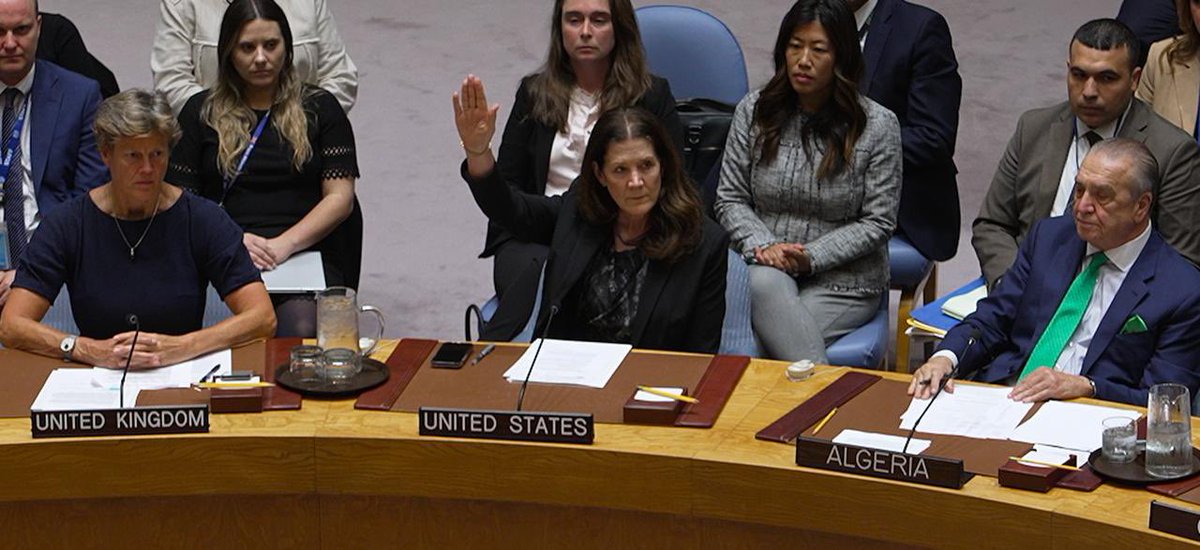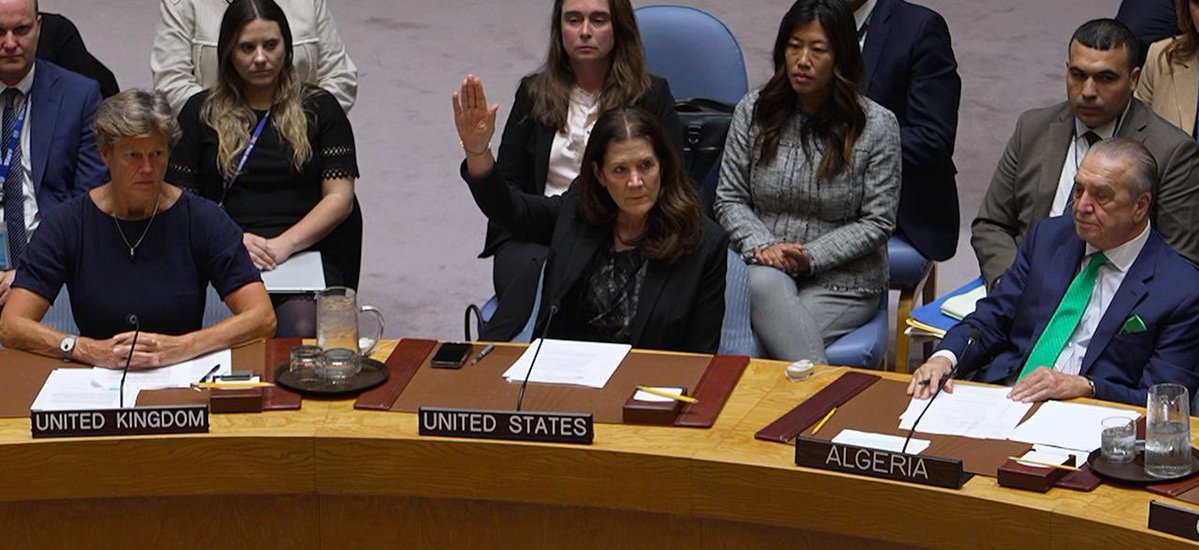U.S. Vetoes Gaza Ceasefire Again: Are Palestinian Lives Worthless?
U.S. Vetoes Gaza Ceasefire Resolution: A Critical Examination of the Humanitarian Crisis
The ongoing conflict in Gaza has escalated to alarming levels, raising urgent concerns about humanitarian conditions and the loss of life, particularly among vulnerable populations such as children. In a significant development on June 4, 2025, the United States exercised its veto power for the sixth time against a resolution at the United Nations Security Council aimed at establishing a ceasefire in Gaza. This action has sparked outrage and debate over the U.S. stance on the Israeli-Palestinian conflict, especially in light of the staggering humanitarian toll the conflict has taken on Palestinian civilians.
Background of the Conflict
The Israeli-Palestinian conflict has a long and complex history, characterized by cycles of violence, territorial disputes, and deep-seated mutual grievances. The situation in Gaza, governed by Hamas since 2007, has been particularly dire. Frequent military confrontations between Israel and Hamas have led to extensive destruction, loss of life, and a humanitarian crisis that has drawn international condemnation.
The Humanitarian Crisis in Gaza
As of June 2025, reports indicate that over 60,000 Palestinians have lost their lives due to the ongoing conflict, with a significant portion being children. A distressing statistic cited by various humanitarian organizations is that approximately 20,000 Palestinian children have died as a result of the hostilities. These figures highlight the urgent need for a ceasefire and humanitarian intervention to alleviate the suffering of civilians caught in the crossfire.
Despite the overwhelming evidence of a humanitarian crisis, the U.S. government has maintained its position of support for Israel. The repeated vetoes of ceasefire resolutions raise questions about the U.S.’s commitment to human rights and its role as a mediator in the Israeli-Palestinian conflict.
- YOU MAY ALSO LIKE TO WATCH THIS TRENDING STORY ON YOUTUBE. Waverly Hills Hospital's Horror Story: The Most Haunted Room 502
The U.S. Position and Its Implications
The U.S. has long been a staunch ally of Israel, providing military and economic support. However, this unwavering support has drawn criticism, particularly in light of the humanitarian implications of its policies. Critics argue that the U.S. is neglecting its moral responsibility to advocate for human rights and humanitarian laws. The vetoes at the UN Security Council can be seen as a tacit endorsement of Israel’s military actions, raising ethical concerns about the prioritization of geopolitical alliances over humanitarian considerations.
International Reactions
The U.S. veto has elicited reactions from various quarters, including human rights organizations, foreign governments, and activists. Many have condemned the veto as an affront to global humanitarian efforts and a disregard for the lives of innocent civilians. The international community has increasingly called for accountability and a reevaluation of U.S. foreign policy in the region.
The Role of Social Media and Public Discourse
Social media plays a crucial role in shaping public discourse around the Israeli-Palestinian conflict. The tweet by Suppressed news, which accompanied the image of the U.S. veto, has gone viral, reflecting the growing frustration and anger among the public regarding the humanitarian situation in Gaza. It serves as a reminder of the power of social media to amplify voices advocating for change and accountability.
Conclusion: The Need for Action
The situation in Gaza remains critical, with the need for immediate humanitarian assistance becoming increasingly urgent. The United States’ veto of ceasefire resolutions underscores the complexities of geopolitical alliances and the profound implications for civilian lives in conflict zones. As the death toll rises, the world watches closely, calling for an end to hostilities and for a renewed commitment to peace and justice.
In summary, the U.S. veto of the Gaza ceasefire resolution highlights the need for a reassessment of foreign policy that prioritizes humanitarian concerns alongside strategic interests. The ongoing crisis in Gaza serves as a stark reminder of the consequences of prolonged conflict and the moral imperative to protect civilian lives in times of war. The international community must work collaboratively to find solutions that uphold human rights, promote peace, and support the rebuilding of lives shattered by violence.

The moment the U.S. vetoed, for the sixth time, a Gaza ceasefire resolution at the UN Security Council.
The U.S. believes that 20,000 Palestinian children killed by Israel is not enough; that over 60,000 Palestinians killed is still not enough. pic.twitter.com/TMykO79bvU
— Suppressed News. (@SuppressedNws) June 4, 2025
The moment the U.S. vetoed, for the sixth time, a Gaza ceasefire resolution at the UN Security Council
In a world where humanitarian crises often take center stage, the ongoing situation in Gaza remains a focal point of international concern. The moment the U.S. vetoed, for the sixth time, a Gaza ceasefire resolution at the UN Security Council, many were left questioning the motives behind such a decision. This veto came amidst reports of staggering casualties, including the tragic deaths of 20,000 Palestinian children and over 60,000 Palestinians overall. It’s hard to wrap your head around the sheer scale of this tragedy, and it raises critical questions about the priorities of global powers.
The U.S. believes that 20,000 Palestinian children killed by Israel is not enough
It’s heartbreaking to think that, in the eyes of some policymakers, the loss of life—especially innocent children’s lives—can be seen as just another statistic. When discussing the U.S. stance on the conflict, it’s crucial to understand the implications of these numbers. The idea that 20,000 Palestinian children killed by Israel is not enough to sway a veto paints a grim picture of the geopolitical landscape. The U.S. government’s decision to reject calls for a ceasefire can feel like a slap in the face to those who advocate for peace and human rights.
Understanding the implications of the U.S. veto
The U.S. has a long history of involvement in Middle Eastern politics, often siding with Israel. This support has been a point of contention, leading many to question whether the U.S. is prioritizing political alliances over human lives. The veto not only affects diplomatic relations but also has real-world consequences for the people living in Gaza. With every veto, the hopes of achieving a peaceful resolution seem to dwindle, leaving many to wonder: what will it take for change to occur?
The global reaction to the veto
When the U.S. vetoed the Gaza ceasefire resolution, the international community reacted with a mix of outrage and disbelief. Countries around the world condemned the decision, highlighting the humanitarian crisis and the urgent need for a ceasefire. Activists and NGOs took to social media platforms, sharing the devastating impact of the conflict on civilians. The situation in Gaza is not just a local issue; it resonates globally, and the veto has amplified calls for accountability and intervention.
The role of social media in raising awareness
Social media has transformed how we consume news and advocate for change. In the wake of the U.S. veto, platforms like Twitter became hotspots for activists and concerned citizens to voice their opinions. Tweets documenting the casualties and the veto itself went viral, sparking discussions about the ethics of international relations and the role of power in humanitarian crises. The visual representation of suffering through images and videos has a profound effect, making the issue more relatable and urgent for those who may not have been aware of the situation.
The complexities of the Israel-Palestine conflict
To fully grasp the implications of the U.S. veto, we must delve deeper into the Israel-Palestine conflict. This isn’t just a simple case of two sides clashing; it’s a complex web of history, politics, and human suffering. The ongoing violence has roots that stretch back decades, and the current situation is just one chapter in a long, painful narrative. Understanding this backdrop is essential for anyone looking to engage with the topic meaningfully.
The importance of ceasefire resolutions
Ceasefire resolutions are critical in times of conflict. They provide a necessary pause in hostilities, allowing humanitarian aid to reach those in need and giving civilians a chance to breathe amidst the chaos. The repeated vetoes by the U.S. indicate a disregard for these essential humanitarian efforts. It raises the question: why is there such resistance to a ceasefire? Is it purely a political maneuver, or is there something deeper at play?
Advocating for change
Amidst the turmoil, there is a glimmer of hope in the form of advocacy and activism. Individuals and organizations are tirelessly working to raise awareness about the plight of the Palestinian people. From protests to social media campaigns, the call for change is growing louder. It’s important to support these movements, whether through donations, sharing information, or simply educating yourself and others about the realities on the ground.
The impact of public opinion
Public opinion plays a significant role in shaping policy decisions. As awareness grows about the humanitarian crisis in Gaza, there’s potential for a shift in how governments approach the conflict. Activists are urging citizens to speak out, contact their representatives, and advocate for a more humane foreign policy. The power of the people is undeniable, and collective action can lead to meaningful change.
The future of U.S. foreign policy in the Middle East
The U.S. vetoing the Gaza ceasefire resolution is a reflection of its broader foreign policy stance in the Middle East. As public awareness increases, there’s potential for a reevaluation of these policies. Will the U.S. continue to prioritize its alliances over humanitarian concerns, or will there be a shift towards a more balanced approach? Only time will tell, but it’s crucial for citizens to remain vigilant and engaged.
Conclusion: A call to action
The ongoing conflict in Gaza and the U.S. response to it is a stark reminder of the need for compassion and empathy in global politics. It’s not just about numbers; it’s about real lives—children, families, and communities torn apart by violence. As we process the implications of the U.S. veto, let’s remember the human element at the heart of this issue. Advocating for peace and supporting humanitarian efforts should be a priority for all of us. Together, we can work towards a future where such tragedies are no longer a reality.
“`

